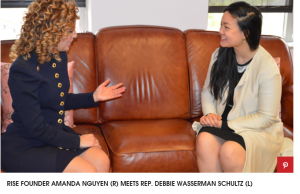Originally published on Elle on February 29, 2016 By MATTIE KAHN.
Amanda Nguyen is on a mission to fix a broken system.
When she was 22 years old, Amanda Nguyen was raped. Within 24 hours of the assault, Nguyen did exactly what she was supposed to: She went to the hospital to have a rape kit examination. But while she took immediate action, there was no guarantee that the critical evidence would be preserved long enough to be of use. Massachusetts, where Nguyen was living at the time, only keeps rape kits on lab shelves for six months.
“What that means is that survivors—every six months—have to fight to hold on to their critical evidence from the trash,” Nguyen, now 24 and the State Department liaison to the White House, explains. “This is truly broken … Every six months, I’m reminded of this traumatic event, this assault.” For herself and for others, she wanted better.
Nguyen started to take a closer look at the legislation that aims to protect victims of sexual violence. She found that laws that varied state-by-state. Many were buried in bigger bills and proved tough to track down.
Nguyen got in touch with Congresswomen Debbie Wasserman Schultz and Ann Wagner, asking them to help her refine a list of more than 20 legal rights that people who are sexually assaulted have in states across the country into a piece of workable federal legislation. Together, they collaborated on House Resolution 230 and introduced it in the House of Representatives. Now, the Senate has taken a critical step further, bringing the Sexual Assault Survivors’ Rights Act to the floor.
The bill seeks to standardize the way sexual assault victims are treated in the justice system and focuses on communication and awareness, ensuring that survivors have access to basic counseling services and are given information about legal options as soon as they report a rape. It demands that labs make it easier for victims to find out the status of their rape kit that the kits themselves not be destroyed at least until they’ve been tested.
“Too many survivors feel like the entire system has failed them,” said Senator Jeanne Shaheen (D-New Hampshire). The primary sponsor of the bill in the Senate, Shaheen continued: “we need a basic set of rights for people who are sexually assaulted.” Nguyen echoes her: “This bill will make it so that no one is unequal under the law.” While she waits for a vote on the bill to be scheduled, Nguyen took some time to tell ELLE.com about her experiences in Washington, her hopes for the legislation, and why, even now, she remains an eternal optimist.
THROUGHOUT THIS PROCESS, HAVE YOU MET ANYONE WHO’S TRIED TO EXPLAIN TO YOU WHY THIS HAS BEEN THE STATUS QUO? HAS ANYONE TRIED TO DEFEND THE SYSTEM
AS IT STANDS NOW TO YOU?
The hardest part about this process has been getting politicians to care. More times than I can count, there were people who debated the political feasibility of my own human rights in front of me. Politicians would tell me, “Oh, my constituents just don’t know me for this,” or, “I have a reelection to run,” or some other reason about why, quite frankly, they couldn’t do the right thing right now.
MORE TIMES THAN I CAN COUNT, THERE WERE PEOPLE WHO DEBATED THE POLITICAL FEASIBILITY OF MY OWN HUMAN RIGHTS IN FRONT OF ME.
Despite that, we went door-to-door in statehouses and in Congress. We Googled
public staff e-mails to figure out who would care about this issue. We met with anyone who would listen to our story. That’s how we found our champions.
Within two months, we researched and drafted and introduced our legislation in the Massachusetts State House. Within four months, other states asked us for the bill because there was so much interest and momentum for it. And within five months, we found ourselves in the halls of the United States Congress. This is truly an example of grassroots democracy. It still works.
HAS THIS PROCESS GIVEN YOU HOPE ABOUT WHAT CONGRESS CAN ACCOMPLISH?
Well, as a disclaimer, I’m a pathologically optimistic person. So while it’s truly discouraging at times to meet people who are more concerned about politics than about doing what’s right, we have gotten this far because there are people who care. There are politicians, there are ordinary citizens, there are people coming out of the communities, saying, “This is an issue we care about” and—especially millennials— saying, “You need to address this.”
I am so grateful to the people who have listened. I am so grateful to Senator Shaheen. Who am I? I sent them an e-mail, and they sat down and listened. But they did that! They listened to the voices of ordinary citizens, and now we’re here. We have a bill, and with this bill we have a path forward, and we have a real chance at making an enormous change for millions of people.
WHAT CAN PEOPLE WHO DON’T HAVE VOTES IN CONGRESS DO?
First, we have the Change.org petition [for Rise, an advocacy organization for victims of sexual assault that Nguyen founded]: Change.org/rise. So, sign the petition. That petition is part of a movement page where survivors and allies across the country have very bravely written and shared their stories about why they need these rights right now.
Second, contact your congressional member, whether it’s your local policy makers or the federal ones. You can easily Google and find out their information and how to reach their offices. Honestly, a phone call makes such a difference.
Third, donate. Rise has a donation button on our website. All of the donations go directly to the work that we are doing. We’re an all-volunteer staff, but we are extremely passionate about what we do. The barrier to make this change is low, so the return on investments is immediate. There is no one that opposes this work. It’s so basic. It’s so common sense. I think when people learn about the issue, they truly understand what we can do to make America into a fairer place for everyone.
ASSUMING THIS BILL GETS PASSED, ARE
THERE FURTHER LEGISLATIVE STEPS ON YOUR WISH LIST? POLICIES THAT YOU’D LIKE TO GET ON THE BOOKS?
Yes, absolutely. This bill will work on a federal level and it will make an impact in federal court. But sexual assault is for the most part a state crime. What we are hoping is that this bill inspires states to look at it as a model and adopt their own bill of rights for sexual assault survivors in their own state.
And we’ve seen this happen before. When the Crime Victims’ Rights Act was passed in 2004, there was a catalyst for action at the state level. Quickly, after CVRA was passed, states adopted it. And today, all 50 states have crime victim protections in place. This is the model that we’re trying to build off of. We’re creating a set of rights at the federal level for all states to consider and hopefully adopt in some form in the near future.
FINALLY, WE HAVE TO KNOW: WHAT WAS IT LIKE TO WORK WITH FUNNY OR DIE ON A VIDEO ABOUT THIS WORK?
It was fantastic! Humor gives us a way to talk about difficult, awkward issues. And quite frankly, that’s what sexual assault is. It’s remarkable that we’re able to use humor and to use social justice comedy to get the word out there. Whatever platform people have in their lives and wherever they come from, they can use that to contribute to this cause. There are so many ways for us to do this. We want to try them all.
Even Supervillains Think Our Sexual Assault Laws Are Insane from Funny Or Die
This interview has been condensed and edited.








